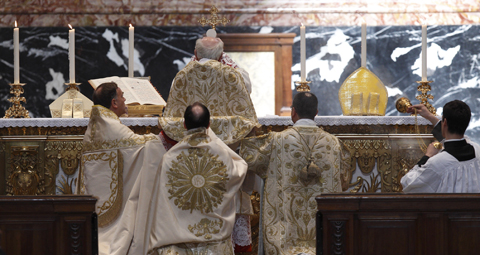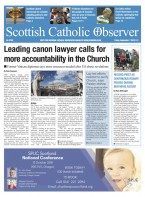August 31 | ![]() 0 COMMENTS
0 COMMENTS ![]() print
print

A Scottish revival of the Latin Mass
FR LIAM O’CONNOR explains the reverence and spirituality within the Extraordinary Form of celebration
IN recent years the Extraordinary Form of the Mass, that is the Traditional Latin Mass, has seen something of a revival, especially amongst younger priests, and young people who have no memory of its use in regular parish life here in Scotland.
I have been celebrating this Mass in a parish setting for two years now in St Mary’s Cleland, in Motherwell Diocese, at the request of my bishop who wanted to make provision for this Mass in response to the faithful who request it.
I would like to take the opportunity to share some of my reflections with readers in order to encourage you to think about making this source of spiritual nourishment a regular part of your devotional life.
I first began attending the Extraordinary Form of the Mass from the age of 18, when I was an undergraduate, and I had the opportunity to serve it each Sunday in the Church of San Simeon Piccolo, Venice, where I spent time as an Erasmus student. Having only known the Ordinary Form growing up, it appeared to me that there was a deep reverence and spirituality contained within the older form Mass that deepened my spiritual life.
I felt an immediate attraction to the very obvious God-centeredness evident in this Rite. As my understanding of the Mass developed, I understood that I was in the presence of a very sacred action, Our Lord’s Sacrifice at Calvary, renewed in the Eternal Sacrifice. This truth took on a new meaning and the desire to be a priest began to take shape in my life.
Throughout the years that I studied in Rome, I was able to attend Mass from time to time at the Chiesa di Gesù e Maria al Corso, and later at, Santa Trinità dei Pellegrini.
After my ordination as a priest, I began to learn the rubrics, and so begin at first celebrating the older form in private celebrations, and then I was asked by my bishop to begin a public celebration for the faithful. I now celebrate this Mass each Thursday evening in the parish here in St Mary’s, Cleland at 7pm.
The Mass has been going now for two years and we normally have between 20 and 30 faithful attend from all parts of the diocese.
Not long before my ordination to the priesthood, Pope Emeritus Benedict XVI issued by motu proprio, a wider encouragement for priests to offer this Mass where the faithful requested it.
As a youngish priest, I would acknowledge that this Mass has nourished and continues to nourish my spiritual life. It was the Mass that countless saints and martyrs knew and loved. To have celebrated this Mass affords another perspective on the Mass; to know both forms is an enriching experience as was the intention of Pope Benedict.
Often people assert that the most striking thing about the older form is that it is celebrated in Latin, a non-vernacular language.
I would concur with this, however, one other striking thing for the layperson, and also the celebrant, is the encounter with the sacred silence in this Mass.
It is celebrated ad orientem, and the priest is required to speak sotto voce throughout the Offertory and Canon.
In his book The Power of Silence, Cardinal Robert Sarah argued that ‘sacred silence’ is an absolutely necessary part of lay participation in the Liturgy. He wrote: “Truly, it is about becoming participants in a sacred mystery that infinitely surpasses us… Christians have the ardent obligation to be open to an act that is so mysterious that they will never be able to perform it by themselves: the sacrifice of Christ.”
Standing at the altar as a priest offering this Mass, one can be absorbed in prayer in a way that is not so possible when looking into the congregation and praying in a loud voice.
If you are coming to this Mass for the first time, it will take a bit of effort to become familiar and engage with the different parts.
The Ordinary of the Mass generally remains the same and so with time it is easy to become familiar with many of the prayers. There are Proper prayers and readings that change from day to day; often people like to bring a hand-missal. I always have booklets and a sheet with the prayers made available for those who come.
It is not really necessary to have a great knowledge of Latin, but perhaps a willingness to try to engage in something that is not so immediate but that with effort can bring rich rewards.
The spirituality of the Mass transcends language, and so is not a barrier—the silent prayerfulness is what draws us into the mysteries.
I don’t think that anyone who attends this Mass thinks themselves better than anyone else: as believers we all have the freedom of the children of God to root our lives in Him and follow Him, ‘And he said to them, “Therefore every scribe who has been trained for the kingdom of heaven is like a householder who brings out of his treasure what is new and what is old.” (Mt.13:52)
For younger people who are given the opportunity to discover this Mass, the motivation is not nostalgia, but rather to be drawn into the mystery of Christ, and the Church here on earth. As we journey through time to eternity, and to the Father, we pray in the presence of and with the angels and saints around us.











